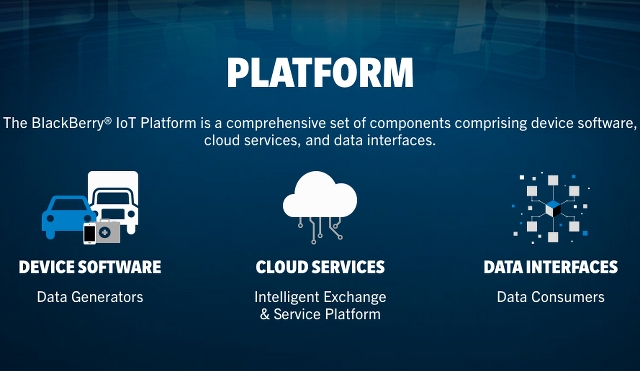At its CES breakfast meeting, BlackBerry released new information about its plans for IoT (the Internet of Things) and the cloud. BlackBerry has been relatively mum on both since the announcement of Project Ion last May.
Intended as the cornerstone to BlackBerry’s “vision to offer end-to-end solutions for the Internet of things”, Project Ion was the catch-all codename for company’s IoT initiatives. Today, the company rebranded Project Ion as Blackerry IoT Platform, and gave a few specifics about its initial focus.
The close overlap between QNX and BlackBerry also pertains to a new operational structure for their IoT plans.
The BlackBerry IoT Platform will initially target industries managing highly mobile resources, such as shipping and automotive markets. The platform will provide pre-built IoT modules for data collection, asset tracking, and lifecycle management, allowing companies to quickly build their own customized solution. Of course, BlackBerry was quick to emphasize that the platform leverages the company’s network infrastructure and device management software to add a needed layer of security.
“The BlackBerry IoT Platform blends the technologies that have enabled BlackBerry to become a leader in both the mobile data security and embedded systems industries,” said Matt Hoffman, VP of Strategy and Marketing, BlackBerry Technology Solutions. “By combining the BlackBerry global network and device lifecycle management proficiency with the embedded software experience of QNX, we have built a modular, cloud-based platform that gives customers the chance to build IoT applications in a secure, efficient and scalable way. Looking ahead, we will extend the platform with other BlackBerry technologies to give developers additional control over the flow of information to devices on the network’s edge.”
Automotive and asset management are core competencies of QNX and BlackBerry, respectively, and make sense as the first targeted verticals. However, BlackBerry indicated today that the BlackBerry IoT Platform will eventually extend into the smart energy and healthcare sectors (an early example of the later can be found in the company’s NantHealth partnership. BlackBerry’s QNX will power NantHealth’s IoT HBox, which will then leverage the BlackBerry IoT Platform to send collected patient data to the cloud).
The close overlap between QNX and BlackBerry also pertains to a new operational structure for their IoT plans. Project Ion was initially announced as a QNX initiative, with newly installed VP Alec Saunders at the helm. Saunders’ departure (ouster?) last October, just prior to Project Ion’s intended select beta, obviously necessitated changes (disclosure: I am also a former BlackBerry employee). To that end, the BlackBerry IoT Platform and QNX itself now fall under the auspice of the BlackBerry Technology Solutions, run by Sandeep Chennakeshu out of Redwood, California – the division’s President and Hoffman’s boss.
It’s unclear as to whether the restructuring has had any effect on BlackBerry’s timeline. Chennakeshu and CEO John Chen were mum on launch timelines for the BlackBerry IoT Platform beyond a release this year. Regardless, today’s announcement made clear that IoT is still a major priority for BlackBerry in 2015.
This article was originally published on our sister-site, MobileSyrup.


